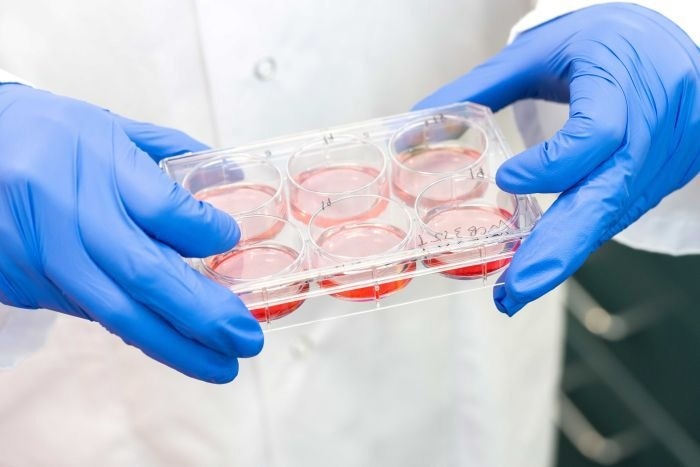A world-first clinical trial launched in Melbourne is being hailed a ‘game-changer’ for its potential to revolutionize the way people with bowel cancer are treated.
 A researcher holding a tray containing tumor organoids, which are the size of a grain of sand. Image Credit: WEHI
A researcher holding a tray containing tumor organoids, which are the size of a grain of sand. Image Credit: WEHI
The trial, based on landmark WEHI research, is the first to look at whether a patient’s response to specific drugs can be accurately predicted, before they begin treatment.
The findings could help replace current trial-and-error treatment practises with a more tailored and personalised approach – improving the survival rates and quality of life for people living with bowel cancer.
At a glance
- New clinical trial launches at multiple Victorian hospitals with potential to revolutionize the way people with bowel cancer are treated.
- The trial is underpinned by a breakthrough study led by WEHI and partner hospitals in Victoria that found tumor organoids – 3D cancer models grown in the lab – can accurately predict what drugs will work for bowel cancer patients with advanced stages of the disease.
- The trial could transform current treatment selection practises for bowel cancer patients, improving their survival rates and quality of life.
Bowel cancer, also known as colorectal cancer, is the second deadliest cancer in Australia, with more than 5000 deaths every year.
While 99% of bowel cancer cases can be treated successfully if found early, less than half of all patients are diagnosed at the initial stages due to a lack of symptoms – making early intervention a challenge.
As there is currently no way to predict how a person with bowel cancer will respond to specific chemotherapy drugs, some patients may receive ineffective treatments.
Now a new clinical trial, FORECAST-2, is hoping to overcome this critical challenge by using tumor organoids – mini cancers grown in the lab from a patient’s own tissue samples.
In the world-first trial, researchers will assess whether tumor organoids can accurately predict what drugs will work for newly diagnosed bowel cancer patients before they begin treatment.
Co-lead researcher, Professor Peter Gibbs, said the trial could revamp the trial-and-error processes that currently guide the treatment selection process for patients.
Each time you give a patient an ineffective treatment, you lose up to three months on a treatment that won’t work,”
Prof Peter Gibbs, Head of Clinical Discovery and Translation, WEHI and medical oncologist, Western Health Hospital
“Unfortunately, up to 40% of bowel cancer patients will develop advanced stages of the disease, requiring chemotherapy treatment.
“Given we now have many treatment options to select from, identifying which of these therapies to give a patient will ultimately have a big impact on their health outcomes.”
The size of a grain of sand, organoids can mimic the characteristics of the cancer from which they are created, including sensitivity to drug treatment.
Each patient tissue sample can be used to grow up to eight tumor organoids, which can then be tested with different drug combinations to determine a patient’s optimal treatment.
“Our research to date shows that if a drug has no effect on the organoid, then this treatment would also have no effect on the patient,” Prof Gibbs said.
“Knowing what is most likely to work before patients start treatment would make a significant difference to their survival outcome and quality of life.”
Pioneering research
The FORECAST-2 trial is now open at Western Health and the Melbourne Private Hospital, with a further five trial sites to be activated in the coming months.
The trial is underpinned by a landmark WEHI-led study that was the first in the world to validate organoid drug testing as an accurate tool in the treatment selection process.
In the study, researchers pre-tested chemotherapy drugs on the organoids of 30 patients with advanced bowel cancer and found organoid drug testing could predict:
- the treatments that won’t work for the individual patient, with 90% accuracy.
- the treatments that will work for the individual patient, with 83% accuracy.
Researchers were also able to identify a new treatment combination for two patients, after their organoids had a positive response to two chemotherapy drugs not typically used to treat bowel cancer.
The new trial will look at whether those results can be replicated in people who have recently been diagnosed.
Associate Professor Oliver Sieber, a corresponding author on the original study and WEHI Laboratory Head, said FORECAST-2 could be a breakthrough in the future of personalized medicines.
“Every cancer is unique and requires a tailored treatment approach for the best outcome,” Assoc Prof Sieber said.
“Being able to predict the treatment outcomes for newly diagnosed patients will give us the best chance of identifying the most promising treatments early.
“It’s an incredibly exciting moment to see our results be translated into a clinical trial that we hope will become a game-changer for bowel cancer patients in Australia and around the world.”
The FORECAST-2 trial is funded by Cancer Australia. It will open at Peter MacCallum Cancer Centre, Eastern Health, Northern Health, the Royal Melbourne Hospital (RMH) and Western Private in coming months.
The research underpinning the FORECAST-2 clinical trial is supported by Cancer Australia, the Stafford Fox Medical Research Foundation, the Australasian Gastro-Intestinal Trials Group (AGITG), Beijing Genomics Institute, The Victorian Cancer Biobank through Cancer Council Victoria, the Victorian State Government, the Guangdong Provincial Key Laboratory of Human Disease Genomics and by the China National GeneBank.
Patients that meet the entry criteria may be offered to join the trial by their treating practitioners in participating hospitals across Australia.